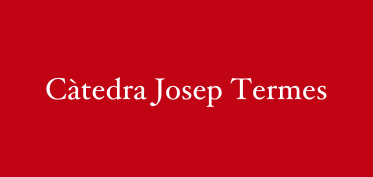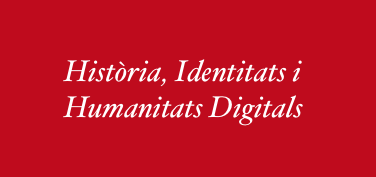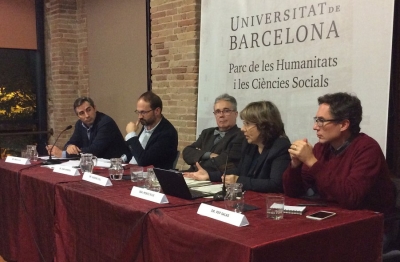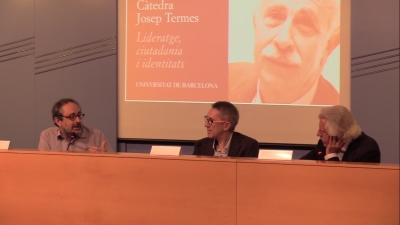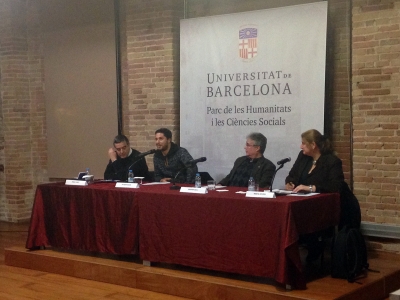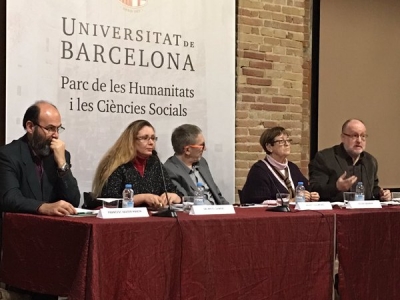Activities 2016
Education as a way to prevent extremisms
We have concluded the series that we began last December and which has been dedicated to analyze the jihadist terrorism from various perspectives and disciplines. The last round table has focused on the education as a way to prevent extremisms.
Three experts on the subject have spoken during the debate.
Marta Rovira, sociologist and member of the GRENPoC, has done an intervention which has been really useful as an introduction to the dialogue. She thinks that access to education is essential to guarantee social cohesion, but this is not enough. Our society has some core problems that make things difficult, by instance, how tough is social climbing nowadays. Regarding this point, she has alluded to the tasks done by Xavier Martínez Celorrio (UB) studying how important is the social climbing in a welcoming society as the Catalan is. She also has expressed her concern about current Spanish politics which seems –since José María Aznar mandat – to pursue confrontation instead of harmony and dialogue. Marta Rovira states we can see this inclination to confrontation in a social level in a way that we can’t get rid of the division between “we” and “they”, who we understand as unconnected to us.
Tayssir Azouz, translator, philologist and general secretary of the Associació de Tunisians a Catalunya, also considers that education must be guaranteed for everyone in order to prevent any kind of radicalization. Actually, he affirms that fundamentalists are afraid of pens and books. School, in addition, has to be used to fight against any kind of discrimination. As long as inequalities are perpetuated, extremisms will remain.
The last speaker, Enric Canet, Director of Citizen Relations of Casal dels Infants, believes that school is a dialogue tool that can prevent the extremisms in a long term, but he points out that education is something wider. The whole environment educates, not just the schools, and the more heterogeneous this environment is, the better. He has highlighted the homogeneity we see in the well-off districts schools of our cities and the little integrative discourse that these schools often transmit to their students.
Summarizing, all three speakers share certain ideas, by instance, the opinion that we use to associate extremism with jihadism but our society presents others forms of extremism, also serious, that should also be fought from schools. One of the mentioned examples of this has been gender violence. They also agree about the role played by mass media, how little they are contributing to the integration and how they are helping to generate the harmful separation between “we” and “they”. Finally, all of them point out that inequalities and segregation are the main problem that we need to eliminate in order to eradicate radicalizations.
Following these links, you can watch the complete video of the event and another one with the highlights.
On behalf of Josep Termes Chair of Leadership, Citizenship and Identities and the Humanities and Social Sciences Park, we want to thank all the speakers of the series, the collaborating entities and the attendees.
Religion and the limits of identity. Summary
We have begun the year holding the second round table of the series that Josep Termes Chair and the Humanities and Social Sciences Park are dedicating to analyze the jihadist terrorism. The debate has been moderated by Agustí Colomines and the main topics have been the connection among religion and identity and how the cultural clash and the lack of acceptance can lead to extremisms.
The speakers have been Dolors Bramon (emeritus professor at UB), Àngel Colom (director of Fundació Nous Catalans), Salwa El Gharbi (president of the training association and consultancy FIKR and AFCAR) and Francesc Xavier Marín (philosopher specialized on Islamic religion, professor at URL and at ISCREB).
Some issues have been highlighted through the debate, such as the importance of making the newcomers feel integrated in our society or the normalization of the Islam in Catalonia.
Dolors Bramon has spoken about the impact of the cover that Charlie Hebdo has done to commemorate the murder perpetrated in January 2015 at their offices. This cover shows a God holding a Kalashnicov while we can read “L’assassin court toujours”. Dolors Bramon has explained some reactions from Catholic publications to this cover.
Àngel Colom has pointed out how necessary is a government plan that makes Muslim people feel integrated in our society. This plan would have to achieve as well the normalization of the Islam in Catalonia. For instance, he considers essential to build mosques in Barcelona. He shows surprise that a city aspiring to become the capital of the Mediterranean doesn’t have temples for the most practiced worship in this area. About the idea of building a large mosque in Barcelona, Dolors Bramon has expressed her concern that this building be sponsored by money coming from the petro-Islam.
Salwa El Gharbi has stressed the idea that to forbid things makes them more desirable for the people. In this way, even the more atheistic person will want a mosque to be built if this is forbidden.
Finally, Francesc Xavier Marín has focused on how difficult is to read a religion using the glasses of another one. He states we should make an effort, as a society, to mitigate the unrest that diversity among different identities uses to cause on us; we should stop seeing other cultures and religions as an alien unconnected to us and belonging to “the others”, these “others” we haven’t totally integrated to our society yet.
Following these links, you can watch the complete video of the event and another one with the highlights.
Remember you still can come to the last conference of the series, which will be celebrated on 10th February: “Education as a way to prevent extremism”. You just need to confirm your attendance writing to (Necessites javascript per veure aquest correu-e).
